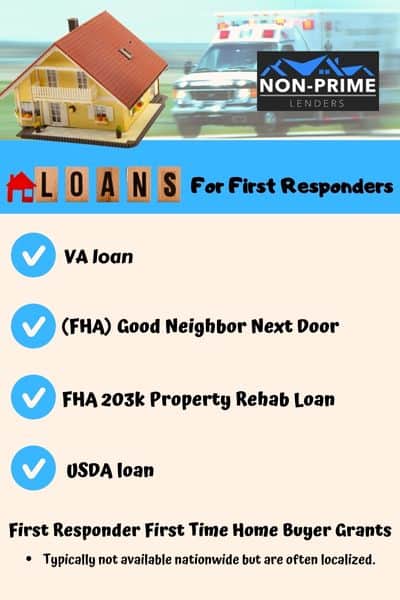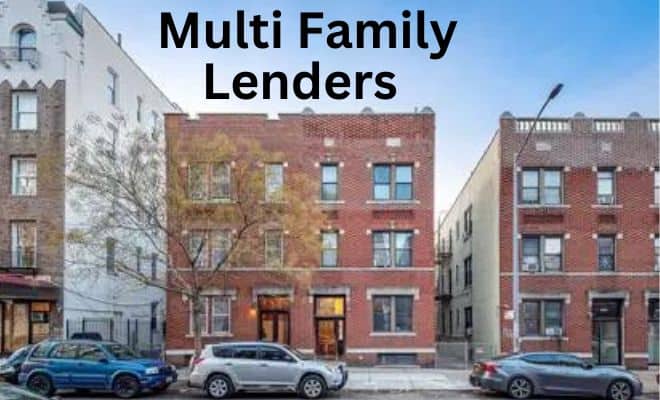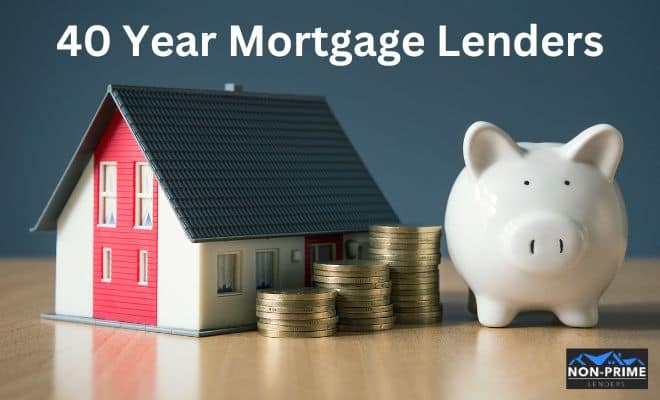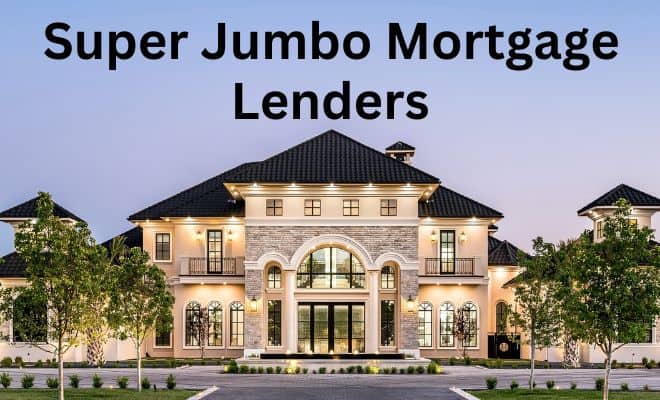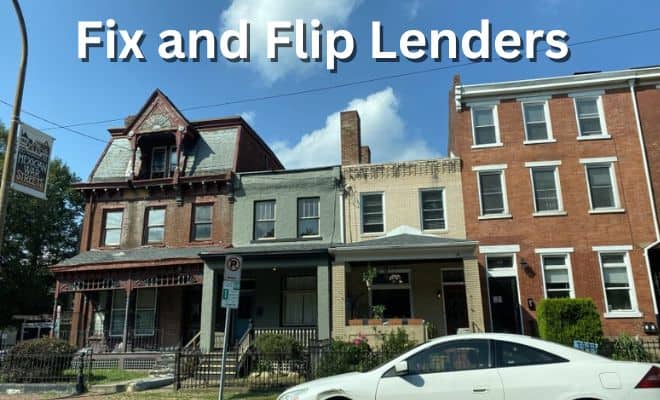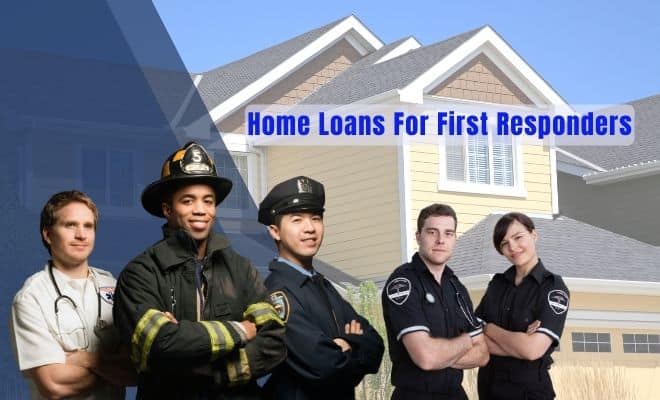
Home Loans For First Responders Plus Special Grants, Lenders & Rates
By definition, first responders put their lives on the line daily. They are the first ones to arrive on the scene of precarious or downright dangerous situations.
Wouldn’t it be nice if there were special home loan programs to reward you for your sacrifice?
If you’re a first responder, you might be surprised to find out that there are homebuying options only available to you, and they can help you become a homeowner sooner than you thought possible.
Who are first responders?
First responders include the list of expected occupations like firefighters and EMTs. But you might be surprised at others that make the list of occupations that may be eligible for special home loans.
- Police officers
- EMTs
- Firefighters
- Paramedics
- 911 Dispatchers
- Flight Nurses
- Border Patrol
- And more
These public servants and more may qualify for lower rates and down payments than the general population.
Loan Programs for First Responders
There is a long list of home loan programs that fit first responders well. Here are just a few referenced below:
Good Neighbor Next Door
Perhaps the most well-known first responder home loan is Good Neighbor Next Door (GNND). It offers a 50% home discount and just $100 down to those in eligible professions.
Who it’s for
- Police officers
- Teachers
- Firefighters
- EMTs
What if offers
On occasion, HUD, the overseer of FHA, forecloses on homes. These homes are then re-sold at auction. Typically, they are scooped up by investors. But before that, HUD holds a few of them in reserve for members of the above-mentioned professions.
HUD cuts its typical price by 50%, then offers the homes for just $100 down if for those using an FHA loan.
If you’re wondering just how good a deal this can be, run some numbers with a Good Neighbor Next Door calculator.
Why such a sweet incentive? The idea is to get high-quality citizens (as first responders are) to move into underserved communities and live there for at least three years. This improves the community and gives public servants an affordable place to live.
How to get it
Apply with an FHA lender. Then find a real estate agent that is HUD-approved to bid on GNND homes. Search for homes using HUD’s GNND locator. The home must be in the area you will be working.
If you see a home, have your chosen agent make a full-price bid on the home. The GNND discount will be applied later. Your bid will be entered into a lottery with all other GNND bidders. If there are four other applicants, for example, your chances of getting the home are 20%.
If you win the bid, submit your earnest money and supply all necessary documentation to the lender. Close on the loan and live in the home for three years. After that point, you can continue living there, sell the home for a profit, or rent it out.
Of all the programs on the market, GNND is likely the most powerful program for first responders.
VA loans
It’s no surprise that U.S. military Veterans become first responders after serving. These civilian professions offers many similarities to military service. That’s probably why 19 percent of police officers are Veterans, whereas Veterans make up only six percent of the general population, says The Marshall Project.
As a first responder who is also a Veteran, you have access to one of the best programs around: The VA home loan.
Who it’s for
First responders and members of any profession who are current or former U.S. military Veterans with eligible service, typically at least two years of active duty.
What it offers
VA loans offer lower-than-market rates, zero down payment, and lenient credit score requirements. They also eliminate the private mortgage insurance requirement, potentially saving home buyers hundreds of dollars per month.
How to get it
Apply with VA loan lender. Submit your Form DD214 to prove military service. The lender will pull a Certificate of Eligibility (COE) from the Department of Veterans Affairs. With a valid COE, the lender can work on your pre-approval.
Use the pre-approval to make offers on homes. Once you have an accepted offer, submit any remaining documents like pay stubs, W2s, and tax returns if self-employed. Sign final loan documents and move into your new home.
FHA 203k Property Rehab Loan
First responders take a different path. They don’t want to sit in an office all day and often they don’t want the typical home buying process, either.
For independently-minded first responders, there’s the FHA 203k Rehab loan. With it, you can buy a run–down home and finance the purchase and repairs with one loan.
Who it’s for
This loan is for first responders who want to buy a low-priced, overlooked home and turn it into an enjoyable place to live.
What it offers
FHA 203k lets you buy a home that wouldn’t normally qualify for financing due to its condition. With the loan funds, you can complete cosmetic or structural enhancements.
These improvements can be purely cosmetic, or address safety issues. Does a house have a great yard and strong bones but a kitchen from the 60s? You can fix that with the 203k loan.
How to get it
Get pre-approved with an FHA lender that specializes in 203k. With your pre-approval, look for homes in your market that have been sitting with no offers due to cosmetic or safety issues.
Make a bid on the home that’s below the asking price. Make sure the price you offer is lower than your full pre-approved amount so there’s room for financing improvements.
With an accepted offer, work with a contractor to get a bid for all your envisioned fixes and submit that to the lender. The lender will then work with the contractor and seller to complete the transaction. The repairs can start after closing.
USDA loan for first responders
Many first responders live in rural areas, and for them, there’s the USDA loan. It removes traditional barriers to homeownership.
Who it’s for
First responders who live in rural and suburban areas are eligible, even if they work in a nearby city.
What it offers
A USDA loan requires zero down payment. This reduces your initial cash outlay by $10,500 on a $300,000 home compared to using FHA. It also comes with below-market rates and lower mortgage insurance than an FHA loan.
How to get it
You must purchase a home in a USDA-designated “rural” area. Keep in mind that many of these areas are quite suburban. It’s worth checking your area even if you think it might not qualify.
Apply with a USDA lender, receive a pre-approval, and start shopping for homes. When you find a home, the lender will guide you through submitting your remaining documents and closing on your home purchase.
First Responder First Time Home Buyer Grants
There are numerous home buyer grants across the country available to community servants and first responders.
Homes for Heroes offers a homebuyer rebate when you use a partner real estate agent and mortgage professional. According to its website, first responders save at least $3,000 when buying or selling a home with the service.
While this is likely a decent program, there are public, government-sponsored programs that might offer even more help.
These types of first responder homebuyer grants are typically not available nationwide but are often localized. As such, the best way to find a grant in your area is to do an internet search for “first responder home buyer grants in [your city, county, and state]”.
For example, doing a similar search in California reveals that CalHFA offers fire department employees and school employees a deferred down payment assistance loan for more than the typical $15,000 cap.
Additionally, in Jefferson Parish, Louisiana, first responders can get a $2,500 non-repayable grant toward their down payment.
If you look hard enough, you might find thousands of dollars in assistance reserved for first responders in your area.
Lenders That Offer Home Loans for First Responders
Many lenders offer first responder programs or can tailor existing programs to your situation.
For example, if your credit score is less than perfect, many lenders specialize in finding programs to suit your score.
Be sure to connect with an experienced lender. Some first responders have variable income, such as seasonal work and overtime. Work with a lender that can maximize your qualification income looking at your entire financial picture.
Do First Responders Get Special Mortgage Rates?
There are special mortgage rates available through city, county, and state government homeownership programs, which are available to first responders.
For instance, many state housing finance agencies offer zero-interest-rate second mortgages that cover your down payment. They require no payment until the home is sold or refinanced.
Additionally, many agencies offer below-market primary mortgage rates when you meet program requirements. They are able to do this using state bond funds. For example, Oregon offers state bond loans at 5.0% at the time of this writing, compared to prevailing standard rates near 6.75% according to Mortgage News Daily. That’s quite a discount, especially when you’re trying to get into your first home without breaking the bank.
First responder home loans: Available nationwide and locally
First responders who are willing to dig a bit could be surprised at the many home loans and home buyer assistance programs available in their area.
As a public servant who is always looking out for others, you’ve earned the homeownership benefits that come with your profession.
